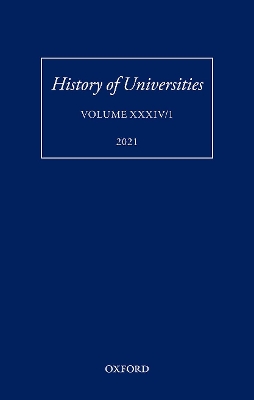History of Universities
2 total works
Volume XXII/1 of History of Universities contains the customary mix of learned articles, book reviews, conference reports, and bibliographical information, which makes this publication such an indispensable tool for the historian of higher education. Its contributions range widely geographically, chronologically, and in subject-matter. The volume is, as always, a lively combination of original research and invaluable reference material.
This is an open access title available under the terms of a CC BY-NC-ND 4.0 International License. It is free to read at Oxford Scholarship Online and offered as a free PDF download from OUP and selected open access locations.
History of Universities XXXIV/1 contains the customary mix of learned articles which makes this publication an indispensable tool for the historian of higher education. This volume offers a global history of research education in the ninteenth and twentieth centuries.
This volume compares the training of scholars in different disciplines and countries across the globe in a century that laid the foundation for modern academia. The articles in this volume examine the different training "instruments" and methods for text-based disciplines (history and philology), laboratory sciences (such as chemistry), theoretical sciences (mathematics, for instance), fieldwork disciplines (linguistics and paleontology), and clinical science (medicine). They consider countries
or societies in Europe, North America, South and East Asia, and Latin America, and analyze the roles of the state, nationalism and internationalism that shaped the institutions and policies for research education. Some of these articles are comparative, while the others are in-depth case studies of
individual disciplines in specific countries at different stages of scientific developments. The introduction and conclusion of this volume bring together the important themes that run across the article and make necessary supplements to present a synthetic picture of the global history of research education.
History of Universities XXXIV/1 contains the customary mix of learned articles which makes this publication an indispensable tool for the historian of higher education. This volume offers a global history of research education in the ninteenth and twentieth centuries.
This volume compares the training of scholars in different disciplines and countries across the globe in a century that laid the foundation for modern academia. The articles in this volume examine the different training "instruments" and methods for text-based disciplines (history and philology), laboratory sciences (such as chemistry), theoretical sciences (mathematics, for instance), fieldwork disciplines (linguistics and paleontology), and clinical science (medicine). They consider countries
or societies in Europe, North America, South and East Asia, and Latin America, and analyze the roles of the state, nationalism and internationalism that shaped the institutions and policies for research education. Some of these articles are comparative, while the others are in-depth case studies of
individual disciplines in specific countries at different stages of scientific developments. The introduction and conclusion of this volume bring together the important themes that run across the article and make necessary supplements to present a synthetic picture of the global history of research education.

